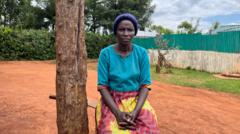A new report has highlighted an alarming trend of increasing femicide cases amid an ongoing pattern of violence against women and girls in Iran.
According to the report in Etimad Daily, in the first three months of the Iranian calendar in 2024 alone (March 20 to June 21), at least 35 women and girls were murdered.
The number is a 25 percent increase from the 28 recorded during the same period in 2023 and a 59% rise from the 22 deaths in 2022.
A massive 85 percent of the murders were committed by the victims' husbands and cases were spread across the country. In 2022, 16 women were killed by their husbands, followed by 15 in 2023, with a sharp increase to 27 in 2024 amid the climate of state crackdowns on women and girls.
Rights activists point to Iran’s laws and patriarchal society based on Islamic law as the primary cause of femicide which has worsened since the 2022 Women, Life, Freedom uprising.
Conditions for women have become so bad that the United Nations branded Iran's policy as "gender apartheid" as state policy legitimizes violence against women.
Honor killings can be carried out for as little as not wearing the mandatory hijab, bringing shame on the family.
UN Women says these gender-related killings are the “most brutal and extreme manifestation of violence against women and girls. According to the latest UN Women report, globally on average, more than 133 women or girls are killed every day by someone in their own family.
Speaking to Iran International, Iranian feminist and human rights activist, Mina Khani, highlighted the lack of accurate statistics in Iran amid heavy censorship and corruption, and the state's own involvement in committing femicide.
Official figures suggest numbers even lower than Germany, she said, with massive discrepancies in both the reporting and recording of such crimes.
"In this context, human rights statistics are crucial," she said. "Organizations like Hengaw report femicide statistics in Iran based on the cases they document, as there is no official statistical reference for human rights organizations to rely on,” Khani stated.
Norway-based rights organization, Hengaw, identified that "at least 50 cases of femicide have been recorded in various cities of Iran since the beginning of 2024.
Khani noted "the state's failure to take legal measures to protect women from domestic violence".
She said, "Instead, the regime has legalized violence attributed to honor and gender-based violence against women, and it also engages in state-sponsored femicides".
High profile cases such as Mahsa Amini and Armita Geravand, who both died in morality police custody, exemplify the role of the state, she said, which "has never been held accountable".
Soraya Fallah, an Iranian researcher and women’s rights activist touched on the surge and prevalence of femicide in Iran adding that the situation highlights an “urgent need for serious measures to change laws and address cultural issues in Iran.”
Fallah echoed Khani’s statements, blaming Iran's discriminatory laws for fueling the femicide crisis.
“The Islamic government of Iran has institutionalized unequal laws and their implementation, enabling crimes like honor killings. These laws, such as Article 630, provide legal grounds for such acts, fuelling patriarchal violence," she said.
Article 630 of the Islamic Penal Code allows a man to kill his wife and her partner if he catches them in the act of consensual adultery, without facing any punishment. This law exclusively targets women. Additionally, a father or paternal grandfather who kills their child is exempt from the retribution sentence, known as Qesas.
"The Islamic Republic uses these laws to maintain power and perpetuate these issues within society. Comprehensive legal and cultural changes are crucial to address these deep-rooted problems and protect women's rights in Iran," she added.
The state’s crackdown on charities dedicated to supporting women experiencing domestic violence further add to the crisis with the UN calling for legal reform to empower women in Iran.
Amnesty International last year said "the Iranian authorities’ oppressive methods of policing women and girls and punishes those who dare to stand up for their rights".
In the wake of the 2022 uprising in which thousands of women were beaten, murdered and imprisoned, the rights group said: "To this day, not a single Iranian official has been held accountable for ordering, planning and committing widespread and systematic human rights violations against women and girls through the implementation of compulsory veiling."

 1 month ago
29
1 month ago
29


